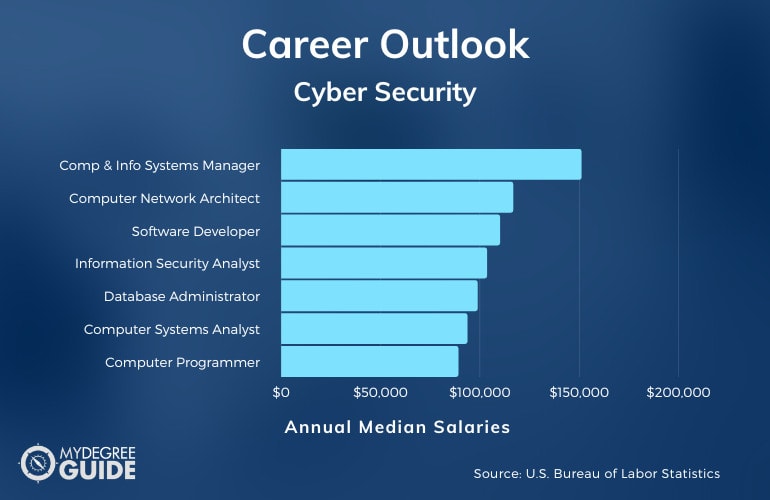If you’re interested in the IT field, need the convenience of an online program, and want a degree that leads to a career with high earnings potential, then an online cyber security degree may be an excellent option to consider.

Editorial Listing ShortCode:
Cybersecurity professionals are needed with some urgency in today’s job market because so many business operations are online and quickly becoming cloud-based. This can pose a threat to companies and organizations that are vulnerable to hacking.
Universities Offering Online Bachelor’s in Cyber Security Degree Programs
Methodology: The following school list is in alphabetical order. To be included, a college or university must be regionally accredited and offer degree programs online or in a hybrid format.
1. Bellevue University
The Bachelor of Science in Cybersecurity program at Bellevue University is designed with five main outcomes in mind.
Graduates should be able to evaluate fundamental cyber security concepts, explain security solutions, apply incident responses, assess risks and threats, and identify attributes associated with professionals in the cyber security field.
Bellevue University is accredited by the Higher Learning Commission.
2. Champlain College
Champlain College’s 120 credit Bachelor of Science in Cybersecurity program allows students to take two, 7 week terms each semester and a total of three semesters a year. This allows students to work at their own pace while investing as little as ten hours a week into their college courses.
Champlain College is accredited by the New England Commission of Higher Education.
3. Charter Oak State College
The cyber security bachelor’s degree program at Charter Oak State College helps students build strong foundations in cyber security and information technology (IT).
Courses cover such topics as hacker techniques, tools and incidents, legal issues in IT, managing risk in IT, fundamentals of security, auditing IT infrastructure, and systems forensics.
Charter Oak State College is accredited by the New England Commission of Higher Education.
4. City University of Seattle
Students enrolled in City University of Seattle’s Bachelor of Science in Cybersecurity program will take a large chunk of their core classes in courses pertaining to governance, risk management, and compliance. Significant time will also be invested in cyber security technology core courses.
The City University of Seattle is accredited by the Northwest Commission on Colleges and Universities.
5. Colorado State University
Students in the computer science bachelor’s program at Colorado State University can select from five unique concentrations, one of which is networks and security.
The program requires 120 credits for completion, but transfer credits from other universities are accepted. There are financial aid options available for qualified students with financial need.
Colorado State is accredited by The Higher Learning Commission.
6. Dakota State University
At Dakota State University, students interested in cyber security can select the cyber operations bachelor’s program. The curriculum blends research with hands-on practice to teach students to discover and investigate different types of cyber attacks.
Students also gain firm computer science foundations in subjects like programming, software development, and networking.
Dakota State University is accredited by the Higher Learning Commission.
7. Davenport University
The Bachelor of Science in Cyber Defense program at Davenport University gives students unique perspectives about cyber security. Students learn about digital forensics, network security, and scripting.
Students can choose between healthcare information and assurance or information security as their specialization. Students will also take management and ethics classes.
Davenport University is accredited by the Higher Learning Commission.
8. Drexel University
Drexel University allows students in its online computing and security technology bachelor’s program to earn college credit for various computer science and information technology (IT) certifications they have already received.
The curriculum is designed to prepare students for vital IT administration and cyber security jobs within government, corporate, and non-profit organizations.
Drexel University is accredited by the Middle States Commission on Higher Education.
9. George Mason University
George Mason University offers a Bachelor of Applied Sciences degree with a cyber security concentration to students who have received an Associate of Applied Sciences degree in cyber security or information systems technology from an approved school. Once accepted, the degree takes between 63 and 66 additional credits to earn.
George Mason University is accredited by the Southern Association of Colleges and Schools Commission on Colleges.
10. Keiser University
The bachelor’s degree in cyber forensics and information security from Keiser University can be earned online, on-campus, or in hybrid format.
The program is designed to provide students with communication and critical thinking skills, a strong foundation in information technology security and cyber forensics, and the ability to combat network attacks.
Keiser University is accredited by the Southern Association of Colleges and Schools Commission on Colleges.
11. Kennesaw State University
Students in Kennesaw State University’s Bachelor of Science in Cyber Security program can gain interdisciplinary knowledge in cyber security, business administration, and information technology (IT).
There’s also input into the curriculum from the school’s criminal justice department so students can learn the ethical and legal issues pertinent to cyber security.
Kennesaw State University is accredited by the Southern Association of Colleges and Schools Commission on Colleges.
12. Liberty University
Liberty University offers a 121 credit Bachelor of Science in Computer Science Cyber Security program that allows students to transfer up to 75% of the required credits from a previously attended university. In addition to courses on network security, premium focus is also placed on database management and modern cryptography.
Liberty University is accredited by the Southern Association of Colleges and Schools Commission on Colleges.
13. Maryville University
Maryville University’s Bachelor of Science in Cyber Security program allows students to choose between offensive cyber security, defensive cyber security, and general cyber security.
Courses are different depending on the chosen tracks, but all tracks require students to take courses in cyber security principles, cyber law, programming, and database design.
Maryville University is accredited by The Higher Learning Commission.
14. Norwich University
The Bachelor of Science in Cyber Security program at Norwich University allows students to streamline their focuses into either computer forensics and vulnerability management or information warfare and security management. Students can transfer up to 90 of the required 120 credits, and a final capstone project is required for graduation.
Norwich University is accredited by the New England Commission of Higher Education.
15. Pennsylvania State University – World Campus
Students at Pennsylvania State University – World Campus who enroll in the interdisciplinary Bachelor of Science in Cyber Security Analytics and Operations program can also work towards several other certifications along the way.
The degree prepares students to work in various fields including health care institutions, government agencies, and non-profit organizations.
Pennsylvania State University – World Campus is accredited by the Middle States Commission on Higher Education.
16. Purdue University
Purdue University’s Bachelor of Science in Cyber Security program provides students with rigorous, hands-on training to help them learn to communicate effectively, identify security threats, analyze complex computing problems, and design and implement computer-based solutions to problems.
The program has CAE-CDE designation from the NSA and Department of Homeland Security.
Purdue University is accredited by The Higher Learning Commission.
17. Regent University
The cyber security bachelor’s program at Regent University is a 120 credit hour program that students complete in 8 week online semesters.
The program provides students with firm, Christian foundations in cyber security, computer information systems, and information technology. Core courses include digital forensics, network defense and security, and internet and intranet security.
Regent University is accredited by the Southern Association of Colleges and Schools Commission on Colleges.
18. Robert Morris University
At Robert Morris University, students in the Bachelor of Science in Cyber Security and Digital Forensics program can choose to streamline their concentrations in either cyber security or digital forensics.
Both programs have ABET accreditation, and notable courses in both include digital internal detection and response, evidence analysis, and IT governance.
Robert Morris University is accredited by the Middle States Commission on Higher Education.
19. Roger Williams University
The Bachelor of Science in Cyber Security and Networking program at Roger Williams University allows students to study aspects of technology and computing related to cyber security, telecommunication and TCP/IP networking.
The program’s curriculum prepares graduates for positions as IT security specialists, incident responders, penetration testers, and network administrators.
Roger Williams University is accredited by the New England Commission of Higher Education.
20. Saint Leo University
Saint Leo University offers a Bachelor of Science in Cyber Security that provides students with many professional development opportunities.
Students are given opportunities to join multiple co-curricular activities, be placed in professional internships and join the school’s chapter of Upsilon Pi Epsilon, all while honing and perfecting their computer skills.
Saint Leo University is accredited by the Southern Association of Colleges and Schools Commission on Colleges.
21. Southern New Hampshire University
Southern New Hampshire University’s Bachelor of Science in Cyber Security program seamlessly blends coursework and hands-on experience to empower students to build cyber security careers. Students can select concentrations from project management or data analytics to suit their career goals. SNHU also offers a master’s program in the field.
Southern New Hampshire University is accredited by the New England Commission of Higher Education.
22. University of Charleston
Students enrolled in the University of Charleston’s cyber security bachelor’s program can earn their degrees in as few as two years. The curriculum prepares students to sit for the CCNA, A+, and Network+ certification exams and can prepare them for careers as cyber trainers, network administrators, and information security analysts.
The University of Charleston is accredited by the Higher Learning Commission.
23. University of Maryland Global Campus
The Bachelor of Science in Cyber Security Management and Policy program at University of Maryland Global Campus is flexible and affordable. The school allows students to transfer up to 90 previously earned credits. The curriculum is rigorous and can prepare students to successfully pass a wide variety of certification exams.
University of Maryland Global Campus is regionally accredited by the Middle States Commission on Higher Education.
24. Utica College
Utica College’s Bachelor of Science in Cyber Security program allows students to choose from four concentrations: network forensics and intrusion investigation, cyber crime and fraud investigation, cyber operations, and information assurance.
The college has CAE-CDE designation from the NSA and DHS, and coursework is informed by federal agencies best practices.
Utica College is accredited by the Middle States Commission on Higher Education.
25. Western Governors University
Students enrolled in the cyber security and information assurance bachelor’s program at West Governors University can potentially earn their degrees in as few as 18 months.
All courses are designed by industry experts and include computer systems and services, networking and security, programming and scripting, information technology, and data management.
Western Governors University is accredited by the Northwest Commission on Colleges and Universities.
Online Cyber Security Degrees

Cyber security has quickly become an extremely relevant issue in every sector.
Nearly every organization or company has a need for cybersecurity professionals. Organizations that accept transactions, have a website, utilize a back-end system, or store data (let alone producing apps), will have a need to keep their information secure from the threats posed by hackers.
Larger companies may have cybersecurity professionals on staff in their IT departments, while smaller companies may contract that work out to IT companies. Unfortunately, organizations that do not address their security needs may face the consequences of a data breach, which can be devastating.
To meet this need, many colleges and universities now offer various degrees and credentials in cyber security. Bachelor’s degree in cybersecurity prgrams can help give you the credential, knowledge, and skills that are needed to succeed in this complex field.
While a cyber security major can give you the qualification to work in this field, this is an ever-changing domain, constantly mutating and gaining complexity.
To keep up, all IT professionals, especially those specializing in cyber security, need to engage in a constant process of continuing education in order to keep their knowledge and skills relevant and effective against cyber threats.
Cyber Security Careers & Salaries

Qualified and competent IT technicians and managers are in demand, but IT professionals with specialized knowledge in cyber security are becoming highly sought after in many industries.
According to the Bureau of Labor Statistics, these are median salaries that people holding a bachelor’s degree in cyber security may be qualified for.
| Careers | Annual Median Salaries |
| Computer and Information Systems Manager | $151,150 |
| Computer Network Architect | $116,780 |
| Software Developer | $110,140 |
| Information Security Analyst | $103,590 |
| Database Administrator | $98,860 |
| Computer Systems Analyst | $93,730 |
| Computer Programmer | $89,190 |
| Network and Computer Systems Administrator | $84,810 |
| Web Developer | $77,200 |
| Computer Support Specialist | $55,510 |
As you can see, there is high earning potential in the IT and cyber security field. While high income often comes with experience, even those just starting out in their careers may find that their qualifications and skills are highly valued.
Choosing an Online Cyber Security Degree

There are many factors to consider when choosing your online cyber security bachelor’s degree. Some of these may include:
- Cost: Make sure the tuition and fee rates are affordable for you, or consider your financial aid options.
- Internships: Hands-on work can amplify your resume, so consider if your chosen program offers experiential learning opportunities.
- Accreditation: Make sure your school has the stamp of approval by a regional accrediting organization.
- Prior Learning Assessment: If you already have IT certifications, some colleges and universities may consider awarding you transfer credits, saving you time and money.
Ultimately, there are many reasons why one cybersecurity program may work for you, but not for someone else. Keeping your own educational needs top of mind when choosing your program is critical.
Cyber Security Curriculum & Courses
With cybersecurity degrees online, you can take fascinating and challenging courses to prepare you for work in the cyber security and IT field.
Here are some examples of classes you might take.
- Introduction to Computer Networks: Indispensable to cyber security students, the basic knowledge of building a secure computer network are explored in this introductory course.
- Cybersecurity Foundations: A basic cybersecurity course can give you a good overview of the concepts that will inform your degree program studies and your career, exploring the different types of cybersecurity threats and the appropriate responses.
- Network Security: Learning about cyber attacks on networks and the defenses against them will be invaluable knowledge.
- Cyber Defense: Cryptography and other defenses that cybersecurity professionals utilize to protect computer networks and data are explored in this course.
- Incident Response and Investigation: This course can help prepare you for real-world security problems by examining the strategies that cyber security professionals utilize when investigating and responding to a security threat.
- Security Risk Management: Strategies for foreseeing and mitigating the risk of security threats are taught in this type of course and are a major aspect of working in cyber security.
- Enterprise Security: This course explores methods for keeping organizations secure, which often involve managing projects, pooling resources, and collaborating with company stakeholders.
- Legal and Human Factors of Cyber Security: Looking at the human side of IT, this course gives an overview how we interact with IT systems, highlighting the importance and ethics of secure systems, as well as the legalities associated with privacy and acceptable use policies.
- Security Assessment and Auditing: This course covers the work that cyber security professionals often engage in: auditing IT systems for security gaps and vulnerabilities and making recommendations for a more secure system.
- Application Security: New applications are developed every day, and this course can teach you about the essential work of finding and resolving vulnerabilities in software.
These kinds of courses have value for someone aspiring to work in cyber security. They provide real world examples of the threats a cyber security professional will encounter and prepare students to think creatively and use their technical skills to solve and prevent security problems.
Cybersecurity Online Degree Admissions Requirements

Most cybersecurity programs do not have particularly specialized admissions criteria, but you can expect the following components to your admissions application.
- Statement of Goals: Colleges and universities usually require an essay on what you hope to achieve with your degree.
- Recommendations: Letters of recommendation are often required. These recommendations usually can be academic, professional, or personal.
- Test Scores: SAT or ACT scores may be required, but many schools are moving away from this requirement.
- Transcripts: Official transcripts from your high school (or equivalent credential) or any colleges or universities you may have attended previously are almost always requested.
These are the requirements that make up most undergraduate admissions applications. International students usually have additional requirements, such as the Test of English as a Foreign Language (TOEFL).
Cybersecurity Programs Accreditation

Accreditation should always be considered when selecting a college or university, so make sure your chosen institution is accredited by a regional accrediting organization.
Colleges and universities undergo a rigorous process of self-evaluation and improvement in order to achieve and maintain their accreditation status, so accreditation often speaks to the quality of the institution.
Whether your college or university is accredited is also important after you graduate. If you ever need to transfer your credits to another college, or if you want to pursue a graduate degree, other institutions may not accept your credits if the college you attended was not accredited.
Financial Aid and Scholarships

How to fund your education will be a priority when making decisions about college. If you are paying out of pocket, make sure that the tuition is affordable, but also consider what financial aid opportunities will be available to you.
Financial aid comes in a few different forms, and may come from the state or federal government. The main types include student loans (which you will need to pay back, usually starting after you graduate) and grants (which do not need to be paid back).
To be considered, you will need to complete the Free Application for Federal Student Aid (FAFSA). Another form of aid that is often overlooked by students is scholarships.
Many colleges and universities have scholarships available, but they can also come from community organizations. Inquire about a scholarship application when choosing a program.
What Can You Do With a Cyber Security Degree?

There are a variety of organizations that seek cybersecurity professionals, from educational institutions to large companies, from banks to charities and foundations.
So many organizations have a need for knowledgeable and highly skilled IT professionals with expertise in cyber security that you may find that your career could go in many directions.
These employers will value not only a degree specialized in computer science or cyber security, but also experience and a proven track record of positive security outcomes.
How Much Does an Online Cyber Security Degree Cost?

Tuition and fee rates will vary across colleges and universities, but you can expect to pay between $320 to $530 per credit hour, in addition to fees, when pursuing a cybersecurity degree.
If that doesn’t seem affordable to you, keep in mind that you may qualify for financial aid, including grants or student loans, and there may be scholarship opportunities you could pursue.
How Long Does it Take to Get an Online Cybersecurity Degree?

If you follow a traditional, 16 week semester and attend full-time, it typically takes four years for a bachelor’s degree. If you follow an 8 week semester and stay continuously enrolled year-round, you can likely finish in less time.
That’s why one factor you may want to consider when choosing your program is the academic calendar of the school. If you have the time and want to earn your degree as quickly as possible, it may be beneficial to look for colleges that offer summer and winter sessions.
Taking courses outside the traditional fall and spring semesters can speed up your cybersecurity degree program considerably.
Are There Any Affordable Online Cyber Security Degrees?
While the range of online tuition and fee rates among colleges and universities is wide, there are affordable programs. You could expect to pay around $320 per credit, plus fees, but some colleges and universities may charge by term rather than by credit.
While funding your education may seem daunting, many people are able to make it work through financial aid, loans, and scholarships.
What is the Best Online School for Cyber Security?
The best school is unique to you. Each college and university has different pros and cons, different qualities that you’ll need to consider.
The best options will vary depending on your goals and interests, but some criteria to consider are accreditation, student to faculty ratio, affordability, availability of scholarships, flexibility of the program, and opportunities for career preparation.
Choosing a degree program is not always an easy decision. It’s important to take a hard look at your own aspirations and educational needs in order to make the choice that’s right for you. Don’t be afraid to ask your school a lot of questions about the program before making your decision.
What Degree is Best for Cyber Security?

While a bachelor’s degree in cyber security is excellent preparation for working in the field, you can also pursue a traditional or online master’s degree in cyber security or an online PhD in cyber security, which can prepare you for higher level management roles. If you’re just starting out, you could even consider a traditional or online associate’s in cyber security to build up your credentials before continuing on with a bachelor’s degree.
Some schools will even consider students without a background in technology for a master’s degree program if they already hold a bachelor’s degree in another field. Another option to consider is starting your educational journey with an associate’s degree from a community college in computer science or a related technology major.
Many community colleges have agreements with four year colleges and universities, which allow your credits to transfer seamlessly. Even without such an agreement, many students gear their community college courses toward the requirements of the bachelor’s degree program they intend to transfer to and have excellent results.
This can save you a lot of money, since community colleges are typically much more affordable than four year institutions.
How Difficult is a Cyber Security Degree?

Along with the general education requirements, you’ll find in most bachelor’s degree programs that focus on critical thinking and communication skills, cybersecurity degrees will require study in advanced math and computer science along with the program courses in cybersecurity.
Yes, a cyber security degree can be difficult, but all bachelor’s degree programs are challenging in different ways.
The difficulty level will depend on your own aptitudes, interest in the coursework, and foundational knowledge of computer science and math (which many programs will help you prepare for).
Is a Cyber Security Degree Worth it?

Yes, a cyber security degree is worth it for many students. According to the Bureau of Labor Statistics, computer and information technology jobs are set to grow at 11% over the next 10 years, much faster than the average for all occupations.
Common cyber security careers in this field include Information security analyst, computer network architect, database administrator, network and computer systems administrator, and computer systems analyst.
There are so many benefits to working in a field that’s growing and experiencing high demand for qualified workers. With the variety in organizations you can work for, and the need for cyber security professionals, you could have a very fulfilling and exciting career in this field.
Getting Your Cybersecurity Degree Online

If you love to work with technology and want a career that will challenge you in new ways every day, then this might be the perfect field for you. Cybersecurity is in demand. Organizations need qualified people who can protect their confidential data and back-end systems from hackers seeking to exploit their vulnerabilities.
Bachelor’s degree in cybersecurity programs can help give you the tools you’ll need to succeed in this growing industry. Thankfully, many institutions are now offering cybersecurity degrees online, which is often the only way that some parents, busy professionals, or people living in remote areas can attend college.
Ultimately, earning your cyber security degree and pursuing your career will be a journey, and in this field, it’s sure to be ever-changing, unique, and exciting.
